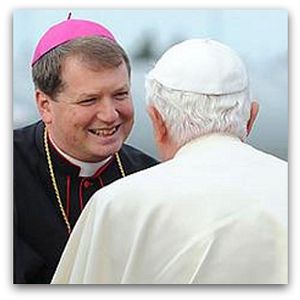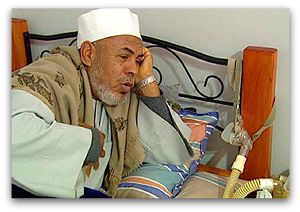By Irfan Yusuf
Eureka Street
July 25, 2008
http://www.eurekastreet.com.au/article.aspx?aeid=8224
When it comes to sensitivity toward victims of sexual abuse and assault, Australian religious leaders could learn a thing or two from Pope Benedict. As could some allegedly conservative commentators and political leaders of all persuasions.
In the past two years, two prominent Australian religious leaders have seemed to cast aspersions on sexual assault victims and their families — former Mufti Sheik Hilaly and Catholic Bishop Anthony Fisher.
 |
Hilaly used a Ramadan address in 2006 to suggest that some women ask to be raped by displaying themselves like 'uncovered meat'. He said this before a few hundred people in a Sydney mosque in Arabic, a language spoken by a minority of Australian Muslims. His remarks only came to general attention once translated into English and reported in the media.
Last Wednesday Fisher, the Australian bishop responsible for organising World Youth Day, responded to questions about the case of two girls repeatedly raped by priest Kevin O'Donnell between 1988 to 1993, when they were primary school students, by saying: 'Happily, I think most of Australia was enjoying, delighting in, the beauty and goodness of these young people (at WDY) ... rather than dwelling crankily, as a few people are doing, on old wounds.'
 |
The insensitivity was heightened because one of the girls committed suicide this year, aged 26.
His remarks were made in English during a press conference before local and international media.
The two cases aren't completely parallel. Islam (at least in its majority Sunni manifestation) doesn't have a clerical hierarchy. Imams play roles similar to rabbis — they are jurists authorised to provide authoritative but not binding opinions on sacred law. The role of a mufti is not identical to that of a bishop.
That said, the vast majority of lay Catholics and Muslims have no meaningful role in the selection or removal of clergy, bishops, popes, imams or muftis. Further, the views expressed by Catholic clergy are not necessarily representative of the majority of ordinary Australian Catholics. The same applies to Muslims, many of whom had been openly criticising Hilaly years before his remarks about uncovered meat.
Notwithstanding these differences, it's interesting to compare responses to the two cases. In the case of Hilaly, commentators and politicians of all stripes and faiths vocally condemned the remarks. Yet some couldn't resist using the incident to fight sectarian and cultural battles.
The front page of Sydney tabloid newspaper The Daily Telegraph on 27 October 2006 carried a photo of the Sheik with the headline 'You heartless ignorant man'. The Sheik's remarks were described as part of 'a deranged sermon'. The editorial carried the headline 'Vile rape remarks can't be forgiven', and attacked his 'wind-up apologist Keysar Trad' for alleging the Sheik was quoted out of context or misunderstood.
Neither Fisher nor his remarks have made it to the front page of the Telegraph. Fisher hasn't been called heartless or ignorant, nor have his comments been described as 'deranged'. The Telegraph hasn't questioned Fisher's claims that his comments have been misunderstood, nor run an editorial on the issue.
Sheik Hamil on A Current Affair The Telegraph was not alone in using Hilaly's comments to fight monocultural warfare. Under the headline 'No, Sheik, saying sorry is not good enough', columnist and ABC board member Janet Albrechtsen (The Australian, 1 November 2006) attacked Hilaly's apology to rape victims before alleging that 'many Muslims support his outpourings of hate'.
She managed to link Hilaly's outburst to TV stations run by Hamas and Hezbollah before concluding that Muslim leaders are conspiring to produce a generation of people hostile to Western values.
Yet Albrechtsen has been silent about Fisher's remarks or his attempts to explain them away. As has Peter Costello, whom Albrechtsen quoted in the wake of the Hilaly comments as saying: 'You wonder whether kids rioting down at Cronulla have heard these kinds of attitudes'.
In fact, I'm yet to hear a peep from a leader of any major political party Australian state or territory.
This isn't just another case of inconsistency inspired by sectarian prejudice, of what's good for the Muslim goose being not good for the non-Muslim gander. The clear message is that misogynistic or insensitive remarks about sexual assault victims are only worthy of universal condemnation if those making the remarks belong to the 'wrong' religious, ethnic and/or cultural background.
When an ABC board member and virtually every State and Federal MP is silent when the families of rape victims appear to be described as 'dwelling crankily ... on old wounds', it means we still live in a society where violence against women is effectively tolerated — or one in which imbecilic words belittling the experience of sexual violence victims are only condemned when it serves sectarian or cultural prejudices.
Ordinary Catholics shouldn't be held accountable for Fisher's statements. They had little or no say in his appointment any more than they have in procedures used by the Church in sexual assault matters.
Nor should commentators and politicians cast aspersions on Australian Catholics in the same manner as many did on Australian Muslims. This would achieve nothing.
When sexual assault becomes a cultural or sectarian wedge, it demeans and insults the suffering of all victims and their families. It also opens to question our society's commitment to unconditionally ending violence against women.
Any original material on these pages is copyright © BishopAccountability.org 2004. Reproduce freely with attribution.